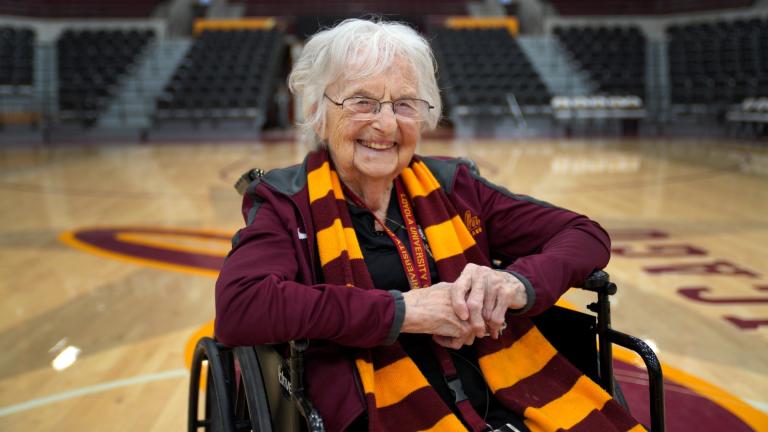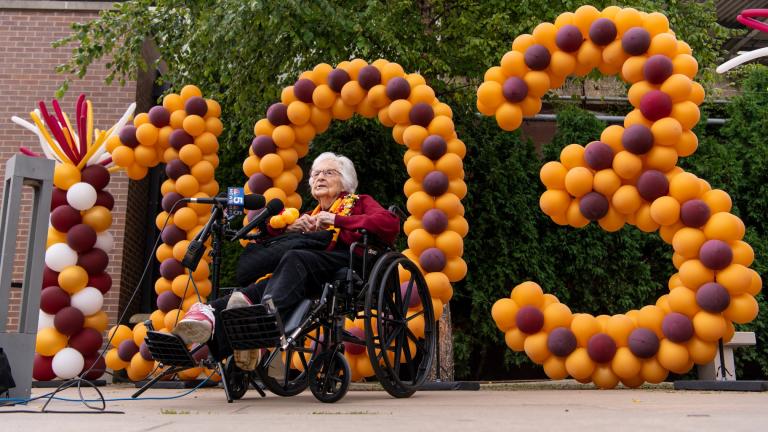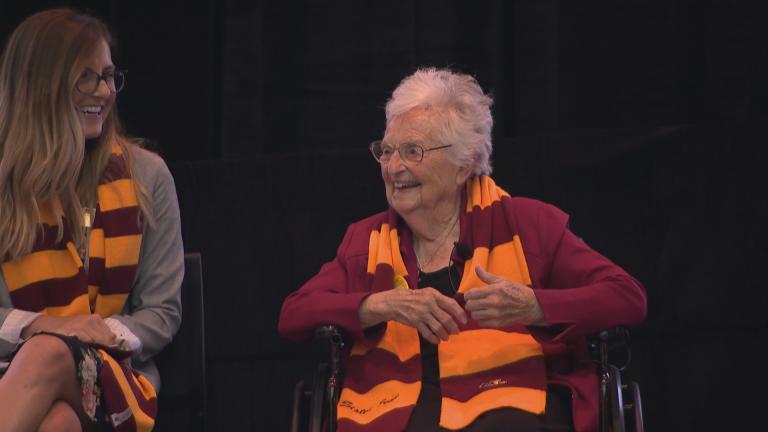College basketball’s most famous fan, Sister Jean, is finally telling her own story. At 103 years old, the Loyola University Chicago matriarch is releasing the memoir “Wake Up with Purpose! What I’ve Learned in My First Hundred Years.”
“Chicago Tonight” spoke with Sister Jean Dolores Schmidt, chaplain of Loyola University Chicago’s men’s basketball team.
WTTW News: You were approached a number of times about writing a book, and you often said no. What drove you to write your memoir now?
Sister Jean Dolores Schmidt: After I denied everybody else, at the time of Final Four last August just before school opened, [co-author] Seth Davis called me after he had talked with our former basketball coach Porter Moser. And Porter said to him, ‘Oh, you know, she should write a book. I’ll give you her phone number.’ So he gave him my cell phone number at that time and called me and was very persuasive. And I said, ‘Oh, I have to ask my, I have to talk to my congregation and to my employer to see if I should do this.’ And they said, ‘Go for it, Sister Jean.’ So that's what I did.
Basketball and sports — we know they’ve always been important in your life. One game you say, though, that you remember vividly was the Game of Change with Loyola and Mississippi State. What do you remember about that game?
Schmidt: Well, of course I wasn’t there. We just had a little television, like 11½ inches, a little black and white. Another sister and I were watching this together. It was delayed. So no one told us — no cell phones or things in those days. No one even told us that we had won the game, so we were playing the game right along with them. It was so exciting when they won, and it was just like spontaneous joy on Sheridan Road. First, because the young men from Campion Hall, which was their residence hall, came over to Mundelein’s coffee hall — they were the only two residences on the campuses — and got all the girls to go with them. Then they walked down the white line on Sheridan Road, practically to Evanston saying, ‘We won! We won. We won!’ And it was just so exciting because it was actually a game of change. And as people review, even the documentary that’s been made now, they realize how important it was.
You write it only took you 98 years to become an overnight sensation. When Loyola was in the Final Four in 2018 — and a lot of folks outside of the Loyola family and outside of Chicago learned who Sister Jean was — what was that like for you at the time?
Schmidt: Well, it was it was very exciting. And after we won the first bracket, I woke up the next morning in the hotel room and I said to myself, ‘Oh, this is not a dream. It’s for real. Get going, girl.’ … The reporters kept following me for each game. They kept on coming to the locker room because they told me to go there to talk to the young men and so forth. And I always smile when they put a microphone in my pocket. One time, I had five microphones in my pocket. And I had a whole host of reporters around me; that was before the game. And they were asking me what I was going to say in my prayer with the team before, and I would always keep a scouting report. And so they said to me, ‘Oh, are you going to tell us?’ and I said, ‘No way. No, you might be a friend of the opponents, and I don’t want them to know what we’re going to do.’
Why is it so important to you to work with young people? Do the students keep you young?
Schmidt: Yes, they do. They really do. I try to keep up with their current vocabulary, you know, which is sometimes a repeat of what happened in the 20s and 30s. The words they use, like cool. They think that’s a new word. That's not a new word. But it’s just fun to hear what they have to say. It’s wonderful to watch the development of them from the time they come as freshmen, and they change so much by Christmastime. I tell their parents when I talk with them to expect … their children to develop, to mature so much over those few months, and I don’t put that in a negative way. I mean, it’s in a positive way. And do they become more responsible. They become very respectful of each other. They’re with people they’ve never met before.
At 103 years old, you don’t have any plans to slow down. But how would you like to be remembered?
Schmidt: Especially as they read my and Seth’s book, I would like to be remembered as a compassionate person, one who really wants to relate to people, help people. To remember me as someone who really loves God and loves them and loves what I do you. Sometimes people ask me, ‘Do you really love what you do?’ Yes, I do. When I wake up in the morning, I thank God for bringing me to the day and asking him to help me serve him the rest of the day. I think what I’m going to do that day. That’s where my purpose comes in. Sometimes plans don’t go to fruition, but that’s where you readjust and do something else and do the plan the next day.








